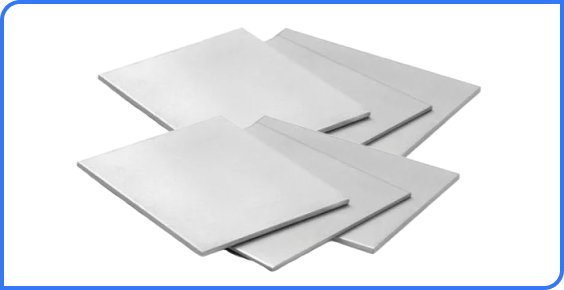Nickel
What is Nickel?
Nickel is a versatile transition metal and alloying element prized for its corrosion resistance, thermal conductivity, and strength. It is commonly used in the manufacture of specialty alloys, plating, battery materials, electronics, and high-performance industrial components.
Asiad Steel Industries supplies high-purity nickel and nickel alloys that meet the rigorous demands of chemical, marine, and energy sectors.

Key Features

Thermal
Stability

Durable
Construction

Precision
Finish

Wide
Compatibility

Corrosion
Resistant
Specifications
| Specification Category | Parameter / Feature | Details / Options |
|---|---|---|
| Size Range | Nominal Size | 10 mm × 10 mm to 500 mm × 500 mm (custom sizes available) |
| Pressure Ratings | ANSI / ASME Class | Class 150, 300, 600, 900, 1500, 2500 |
| PN Ratings | PN6, PN10, PN16, PN25, PN40, PN64 | |
| Product Types | Nickel Pipes | ERW & Seamless, standard wall thickness |
| Nickel Sheets / Plates | 2B, Hot Rolled, Matt, Mirror Finish, Coloured | |
| Nickel Rods / Bars | Round, Hex, Square | |
| Nickel Fittings | Elbows, Tees, Reducers, Couplings | |
| Material Options | Nickel Grades | Nickel 200, Nickel 201, Monel 400/K500 |
| Other Alloys | Inconel 600/625/825 (if applicable), Nickel-Copper Alloys | |
| Standards & Certifications | ASTM | ASTM B162, ASTM B164, ASTM B127, ASTM B446 |
| ASME / ANSI | ASME B36.10, ASME B36.19 | |
| European Standards | EN 10204, EN 10210 | |
| Certifications | ISO 9001, PED 2014/68/EU, NACE MR0175, AS9100 | |
| Design Features | Wall Thickness | As per ASTM / EN standards, customized options available |
| End Connections | Plain Ends, Beveled Ends | |
| Tolerance | As per ASTM / ASME / EN standards | |
| Coating & Surface Finish | Anti-Corrosion Coating | Passivation, Nickel Plating |
| Optional Coatings | PTFE, PVD, Anodizing | |
| Surface Finish | Mill Finish, Pickled, Polished, Bead Blasted | |
| Testing & Inspection | Pressure Testing | Hydrostatic, Pneumatic |
| Non-Destructive Testing | Radiography (RT), Ultrasonic (UT), Dye Penetrant (DPT) | |
| Destructive Testing | Tensile, Hardness, Impact |
Dimensions
| Parameter / Feature | Nickel Pipes / Tubes | Nickel Sheets / Plates | Nickel Rods / Bars |
|---|---|---|---|
| Outer Diameter (OD) / Width | 6 mm – 500 mm | 100 mm – 2000 mm | Round: 6 mm – 300 mm, Square: 10 mm – 300 mm, Hex: 10 mm – 250 mm |
| Inner Diameter (ID) | OD minus wall thickness | – | – |
| Wall Thickness / Thickness | 1 mm – 25 mm | 0.5 mm – 50 mm | – |
| Length | 1 m – 6 m | 100 mm – 6000 mm | 1 m – 6 m |
| Surface Finish | Mill, Polished, Satin, Bead Blasted | Mill, Polished, Satin, Bead Blasted | Mill, Polished, Satin, Bead Blasted |
| Material / Grades | Nickel 200, Nickel 201, Monel 400/K500 | Nickel 200, Nickel 201, Monel 400/K500 | Nickel 200, Nickel 201, Monel 400/K500 |
| End Connections | Plain Ends, Beveled Ends, Threaded | – | – |
| Coatings | Passivation, Nickel Plating, Optional PTFE, PVD | Passivation, Nickel Plating, Optional PTFE, PVD | Passivation, Nickel Plating, Optional PTFE, PVD |
| Testing & Inspection | Hydrostatic / Pneumatic, RT, UT, MPI, DPT, Tensile, Hardness, Impact | Hydrostatic / Pneumatic, RT, UT, MPI, DPT, Tensile, Hardness, Impact | Hydrostatic / Pneumatic, RT, UT, MPI, DPT, Tensile, Hardness, Impact |
Mechanical Properties
| Property | Value | Unit / Standard |
|---|---|---|
| Tensile Strength | 370 – 620 | MPa (Nickel 200 / 201) |
| Yield Strength | 70 – 300 | MPa |
| Hardness | 70 – 200 | HB (Brinell) |
| Elongation | ≥ 25 – 50 | % |
| Density | 8.9 – 8.91 | g/cm³ |
| Impact Toughness | ≥ 25 – 70 | J (Charpy, grade-dependent) |
| Modulus of Elasticity (E) | ~200 | GPa |
| Fatigue Strength | 180 – 350 | MPa |
| Corrosion Resistance | Excellent (resistant to reducing agents, caustics, and oxidizing acids) | – |
| Thermal Conductivity | 90 – 100 | W/m·K |
| Coefficient of Thermal Expansion | 13 – 16 ×10⁻⁶ | /°C |
| Yield Ratio (YS/UTS) | 0.25 – 0.55 | – |
| Poisson’s Ratio | 0.31 – 0.33 | – |
| Brinell Hardness Range | 70 – 200 | HB |
| Surface Finish | Machined, Polished, Passivated | – |
| Welding Type | TIG, MIG, Resistance, Electron Beam | – |
| Operating Temperature Range | -200 to 600 | °C (grade-dependent) |
| Pressure Rating | Class 150, 300, 600, 900, 1500, 2500 | ASME / ASTM Standards |
Chemical Composition
| Element | Nickel 200 (%) | Nickel 201 (%) | Alloy 400 (Monel 400) (%) | Alloy K500 (Monel K500) (%) |
|---|---|---|---|---|
| Nickel (Ni) | 99.0 min | 99.0 min | 63.0 min | 63.0 min |
| Copper (Cu) | 0.25 max | 0.25 max | 28.0 – 34.0 | 27.0 – 33.0 |
| Iron (Fe) | 0.40 max | 0.40 max | 2.5 max | 2.0 max |
| Manganese (Mn) | 0.35 max | 0.35 max | 2.0 max | 1.5 max |
| Silicon (Si) | 0.35 max | 0.35 max | 0.50 max | 0.50 max |
| Carbon (C) | 0.15 max | 0.02 max | 0.30 max | 0.25 max |
| Sulfur (S) | 0.01 max | 0.01 max | 0.024 max | 0.01 max |
| Titanium (Ti) | — | — | — | 0.35 max |
| Aluminum (Al) | — | — | — | 2.3 – 3.15 |
| Other Elements | — | — | — | ≤ 2.0 (total) |
Applications of Nickel
Construction &
Infrastructure
Automotive & Heavy
Equipment
Manufacturing &
Fabrication
Medical & Laboratory
Equipment
Electrical &
Electronics Assembly
Oil, Gas & Petrochemical
Installations
Do you have questions?
Nickel 200 has higher carbon content, while 201 is a low-carbon version ideal for applications requiring resistance to intergranular corrosion.
Pure nickel is ferromagnetic at room temperature, making it suitable for electrical and magnetic applications.
Yes, nickel is used in food processing equipment when combined with stainless steel due to its non-reactive properties.
Yes. Nickel alloys exhibit excellent seawater corrosion resistance, especially in chloride-rich environments


